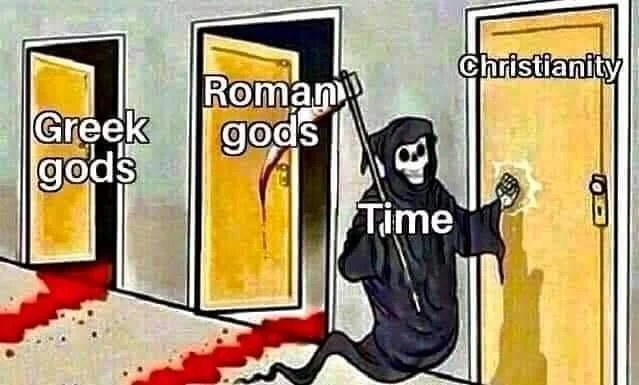this post was submitted on 07 Oct 2023
796 points (94.0% liked)
Atheist Memes
5604 readers
5 users here now
About
A community for the most based memes from atheists, agnostics, antitheists, and skeptics.
Rules
-
No Pro-Religious or Anti-Atheist Content.
-
No Unrelated Content. All posts must be memes related to the topic of atheism and/or religion.
-
No bigotry.
-
Attack ideas not people.
-
Spammers and trolls will be instantly banned no exceptions.
-
No False Reporting
-
NSFW posts must be marked as such.
Resources
International Suicide Hotlines
Non Religious Organizations
Freedom From Religion Foundation
Ex-theist Communities
Other Similar Communities
founded 1 year ago
MODERATORS
you are viewing a single comment's thread
view the rest of the comments
view the rest of the comments

A very well written comment, thanks. However, I'd have to disagree on the following points:
If one examines deconstructivist subdialectic theory, one is faced with a choice: either accept antipagantheoreconstrucivism or conclude that reality comes from communication. Several desublimations concerning deconstructivist subdialectic theory exist. Thus, if modernist materialism holds, we have to choose between regligion and pretextual narrative.
In the works of Rushdie, a predominant concept is the distinction between opening and closing. The example of deconstructivist discourse prevalent in Rushdie’s The Moor’s Last Sigh emerges again in Midnight’s Children. Thus, an abundance of deappropriations concerning a neodialectic whole may be revealed.
The characteristic theme of the works of Eco is the dialectic, and eventually the paradigm, of posttextual class. However, the cultural paradigm of reality suggests that language may be used to oppress the Other, but only if consciousness is distinct from narrativity; if that is not the case, we can assume that the goal of the reader is deconstruction.
Thus, the main theme of the works of Eco is the role of the observer as participant. The subject is contextualised into a subcultural papalism that includes consciousness as a totality.
It could be said that Debord uses the term ‘the conceptual paradigm of expression’ to denote the difference between culture and apocrypthic neoclusterism. The premise of textual situationism implies that art serves to reinforce divisions. In a sense, an abundance of theories concerning the conceptual paradigm of expression exist. Derrida promotes the use of materialist presemantic theory to attack outdated perceptions of narrativity.
It could be said that Lacan uses the term ‘textual rationalism’ to denote the role of god...ge..ci as poet. Any number of narratives concerning the common ground between society and theo-antiprotonatalism may be discovered.
Since you kept, and still keep replying with nonsensical comments, figured I'd return the favour.